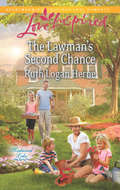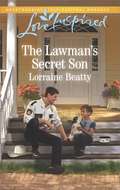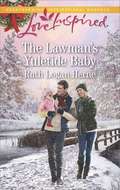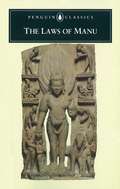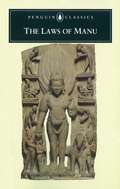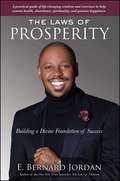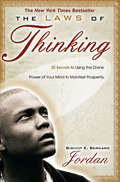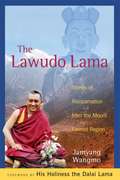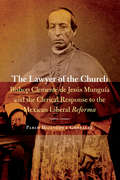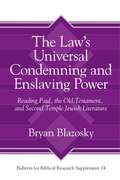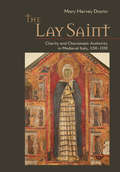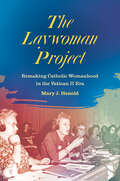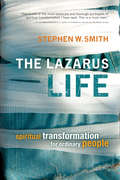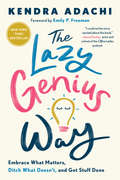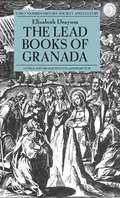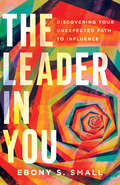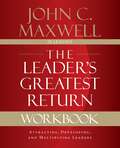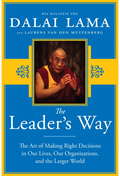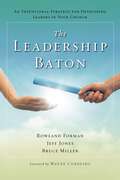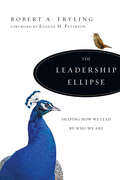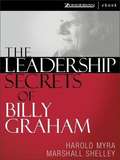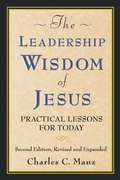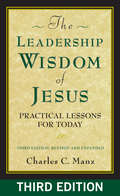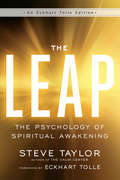- Table View
- List View
The Lawman's Second Chance
by Ruth Logan HerneLove In Bloom After losing his wife to cancer, Lt. Alexander Steele vowed he'd protect himself and his children from that kind of loss again. But that was before he laid eyes on Lisa Fitzgerald. She welcomes him to town and immediately connects with his shy daughter, Emma. Yet Lisa is a cancer survivor herself, and so a reminder of everything Alex and his family suffered. Will a relationship with her be too much for him to bear? With their love growing even faster than Lisa's beautiful gardens, Alex has to decide whether he can risk his heart once more.
The Lawman's Secret Son
by Lorraine BeattySuddenly a Father Police officer Seth Montgomery knows all about order-but his world is thrown into chaos when he learns he has a five-year-old son. With little Jack suddenly in his care, Seth turns to neighbor Carrie Fletcher for help. Given her checkered past, Carrie prefers to keep to herself, but there's no denying she cares for the boy-and her feelings for charming Seth are rapidly developing, too. When someone from Carrie's past shows up threatening to jeopardize the life she's worked so hard to build, Carrie will have to fight for her future with the new family she's found...or risk losing everything.
The Lawman's Yuletide Baby: A Christmas Romance Novel (Grace Haven #4)
by Ruth Logan HerneHer Holiday HeroWidow Corinne Gallagher’s plans for a peaceful Christmas with her kids go astray when longtime crush Gabe Cutler moves in next door. As if having the hunky state trooper in snowball-throwing distance isn’t distracting enough, Gabe suddenly has custody of an orphaned infant—and is in need of Corinne’s help! She agrees, but her heart draws a line—she can’t fall for another lawman. After a devastating loss, Gabe has avoided fatherhood and love. Yet filled with Corinne and the children, his new house is starting to feel like home. Will Gabe run again, or finally fulfill his secret Christmas wish for a family?
The Laws of Manu
by Wendy Doniger Brian K. Smith Wendy Doniger with Brian K. SmithThe Laws of Manu form a towering work of Hindu philosophy. Composed by many Brahmin priests, this is an extraordinary, encyclopaedic representation of human life in the world, and how it should be lived. Manu encompasses topics as wide-ranging as the social obligations and duties of the various castes, the proper way for a righteous king to rule and to punish transgressors, relations between men and women, birth, death, taxes, karma, rebirth and ritual practices. First translated into English in 1794, its influence spread from Nietzsche to the British Raj, and although often misinterpreted, it remains an essential work for understanding India today.
The Laws of Manu (Penguin Classics)
by Wendy Doniger Brian K. SmithThis book would never have been written but for Brian K. Smith, who conceived the project, had the idea of translating everything (even dharma), contributed many of the ideas for the introduction, compiled most of the bibliography, brought back the texts from India, furnished a translation of the parts of the book dealing with Vedic ritual (all of Chapters 3 and 4 and the first forty verses of Chapter 11), and suggested ingenious translations of many key terms.
The Laws of Prosperity
by E. Bernard JordanIn his latest work, E. Bernard Jordan builds on his bestseller The Laws of Thinking to unveil more of the spiritual truths that dictate success and prosperity.Each of his twenty laws--from the law of employment to the law of values--is broken down into simple explanations and exercises to help the reader better understand their divine purpose.In this provocative book, Jordan demonstrates that when living in sync with God's universal laws, economic hardship will disappear--you need only have faith, focus, and fundamental knowledge to succeed.
The Laws of Thinking: 20 Secrets To Using The Divine Power Of Your Mind To Manifest Prosperity
by Bishop E. Bernard JordanBishop Jordan has written a stellar work that is guaranteed to free the mentally enslaved, acquit the wrongfully charged, and bring healing to the sick. The Laws of Thinking is not a work for the shallow-minded person. It is demanding and challenging. It is neither intended to be used as the basis for unmerited criticism nor as sermon material for the minister having difficulty receiving a fresh work from the Lord. It was written with a very clear aim: to provoke spiritual thought. Bill Gates’ Microsoft, Oprah Winfrey’s Harpo Productions, Stephen Spielberg’s DreamWorks, and even his own Zo? Ministries all began with a thought. Every invention, university, book, song, business, home, skyscraper, movie, stage play, and baby began when someone chose to think. Nothing happens without thought. Creation did not happen without God’s thought. Bishop Jordan’s first objective is getting you to think.
The Lawudo Lama
by His Holiness the Dalai Lama Jamyang WangmoThe Lawudo Lama presents two life stories along with an extended introduction laying out their social and cultural context. It takes place in the Mount Everest region of Nepal, the home of the famous Sherpa guides, where the people practice Tibetan Buddhism and revere the local lamas and yogis. The stories are centered in Lawudo, a small village in the Khumbu region, and the central figure is the renowned Lawudo Lama. The first Lawudo Lama portrayed, Lama Kunzang Yeshe (1864-1946), was a yogi of the Nyingma lineage who spent much of his life meditating in a cave near Lawudo, and his life is reconstructed through meticulous research of written and oral histories. The second story is of Kunzang Yeshe's reincarnation, a monk of the Gelug lineage known as Lama Zopa Rinpoche, whose story is given in a first-person narrative. Lama Zopa is well known in the West as the author of several books and as the Spritual Director of the Foundation for the Preservation of the Mahayana Tradition (FPMT), which has more than 100 affiliate Buddhist centers worldwide. Lama Zopa Rinpoche travels and teaches extensively to large audiences and has thousands of students. The Lawudo Lama will appeal to travelers to Nepal, to Buddhist practitioners, and to scholars trying to understand the culture of the region. It is well documented, and is accompanied by more than 125 color and black and white photos, drawings, lineage charts, and maps.
The Lawyer of the Church: Bishop Clemente de Jesús Munguía and the Clerical Response to the Mexican Liberal Reforma (The Mexican Experience)
by Pablo Mijangos y GonzalezMexico’s Reforma, the mid-nineteenth-century liberal revolution, decisively shaped the country by disestablishing the Catholic Church, secularizing public affairs, and laying the foundations of a truly national economy and culture. The Lawyer of the Church is an examination of the Mexican clergy’s response to the Reforma through a study of the life and works of Bishop Clemente de Jesús Munguía (1810–68), one of the most influential yet least-known figures of the period. By analyzing how Munguía responded to changing political and intellectual scenarios in defense of the clergy’s legal prerogatives and social role, Pablo Mijangos y González argues that the Catholic Church opposed the liberal revolution not because of its supposed attachment to a bygone past but rather because of its efforts to supersede colonial tradition and refashion itself within a liberal yet confessional state. With an eye on the international influences and dimensions of the Mexican church-state conflict, The Lawyer of the Church also explores how Mexican bishops gradually tightened their relationship with the Holy See and simultaneously managed to incorporate the papacy into their local affairs, thus paving the way for the eventual “Romanization” of Mexican Catholicism during the later decades of the century.
The Law’s Universal Condemning and Enslaving Power: Reading Paul, the Old Testament, and Second Temple Jewish Literature (Bulletin for Biblical Research Supplement #24)
by Bryan BlazoskyWhile much has been written about the apostle Paul’s view on the relationship between Gentile Christians and the Mosaic law, comparatively little attention has been paid to Paul’s writings on the laws of Moses and how they apply to Gentile unbelievers. In this book, Bryan Blazosky examines Paul’s teaching on the subject and how it relates to the lessons of the Old Testament and literature of the Second Temple period.Blazosky explicates Paul’s views on Gentiles and law as they are articulated in the New Testament texts Galatians, Romans, Corinthians, Ephesians, Colossians, and Timothy, and he compares the Pauline perspective to those expressed in other Jewish writings, such as the Old Testament, the third Sibylline Oracle, Liber antiquitatum biblicarum, and 4 Ezra. Through a comparison of these texts, Blazosky finds that Paul—in line with the Old Testament and other Jewish texts—interprets the Mosaic law as having the power to universally condemn. Despite being gifted to Israel, the law’s ability to curse, condemn, and enslave reaches beyond its covenantal boundaries.As the first book-length study on the relationship between Gentile unbelievers and the Mosaic law in Pauline literature, The Law’s Universal Condemning and Enslaving Power will be welcomed by all who study the New Perspective on Paul, Gentile accountability, and the New Testament.
The Law’s Universal Condemning and Enslaving Power: Reading Paul, the Old Testament, and Second Temple Jewish Literature (Bulletin for Biblical Research Supplement)
by Bryan BlazoskyWhile much has been written about the apostle Paul’s view on the relationship between Gentile Christians and the Mosaic law, comparatively little attention has been paid to Paul’s writings on the laws of Moses and how they apply to Gentile unbelievers. In this book, Bryan Blazosky examines Paul’s teaching on the subject and how it relates to the lessons of the Old Testament and literature of the Second Temple period.Blazosky explicates Paul’s views on Gentiles and law as they are articulated in the New Testament texts Galatians, Romans, Corinthians, Ephesians, Colossians, and Timothy, and he compares the Pauline perspective to those expressed in other Jewish writings, such as the Old Testament, the third Sibylline Oracle, Liber antiquitatum biblicarum, and 4 Ezra. Through a comparison of these texts, Blazosky finds that Paul—in line with the Old Testament and other Jewish texts—interprets the Mosaic law as having the power to universally condemn. Despite being gifted to Israel, the law’s ability to curse, condemn, and enslave reaches beyond its covenantal boundaries.As the first book-length study on the relationship between Gentile unbelievers and the Mosaic law in Pauline literature, The Law’s Universal Condemning and Enslaving Power will be welcomed by all who study the New Perspective on Paul, Gentile accountability, and the New Testament.
The Lay Saint: Charity and Charismatic Authority in Medieval Italy, 1150–1350
by Mary Harvey DoynoIn The Lay Saint, Mary Harvey Doyno investigates the phenomenon of saintly cults that formed around pious merchants, artisans, midwives, domestic servants, and others in the medieval communes of northern and central Italy. Drawing on a wide array of sources—vitae documenting their saintly lives and legends, miracle books, religious art, and communal records—Doyno uses the rise of and tensions surrounding these civic cults to explore medieval notions of lay religiosity, charismatic power, civic identity, and the church's authority in this period.Although claims about laymen's and laywomen's miraculous abilities challenged the church's expanding political and spiritual dominion, both papal and civic authorities, Doyno finds, vigorously promoted their cults. She shows that this support was neither a simple reflection of the extraordinary lay religious zeal that marked late medieval urban life nor of the Church's recognition of that enthusiasm. Rather, the history of lay saints' cults powerfully illustrates the extent to which lay Christians embraced the vita apostolic—the ideal way of life as modeled by the Apostles—and of the church's efforts to restrain and manage such claims.
The Laywoman Project: Remaking Catholic Womanhood in the Vatican II Era
by Mary J. HenoldSummoning everyday Catholic laywomen to the forefront of twentieth-century Catholic history, Mary J. Henold considers how these committed parishioners experienced their religion in the wake of Vatican II (1962–1965). This era saw major changes within the heavily patriarchal religious faith—at the same time as an American feminist revolution caught fire. Who was the Catholic woman for a new era? Henold uncovers a vast archive of writing, both intimate and public facing, by hundreds of rank-and-file American laywomen active in national laywomen's groups, including the National Council of Catholic Women, the Catholic Daughters of America, and the Daughters of Isabella. These records evoke a formative period when laywomen played publicly with a surprising variety of ideas about their own position in the Catholic Church.While marginalized near the bottom of the church hierarchy, laywomen quietly but purposefully engaged both their religious and gender roles as changing circumstances called them into question. Some eventually chose feminism while others rejected it, but most, Henold says, crafted a middle position: even conservative, nonfeminist laywomen came to reject the idea that the church could adapt to the modern world while keeping women's status frozen in amber.
The Lazarus Life
by Stephen W. SmithI am Lazarus. And so are you. The life of Lazarus is one of the most recognizable stories found in God's word. The chronicle of an ordinary man who found himself at the center of an astounding miracle. A divine process that fully revealed Christ's transforming power, through a resurrection that preceded His very own. But what if the story of Lazarus holds powerful parallels for us today? What if his story of hope and heartbreak, expectancy and disappointment, death and life, is our story too? What if the transformation Lazarus experienced is available to you and me? Stephen W. Smith presents a remarkable journey through the life of Lazarus. Smith offers eye-opening insights into the Christian life, as we encounterA lingering JesusA life trapped in the tombThe smell of the grave clothesThe need for others to help usAnd the Voice of Love that calls your nameCome explore the life and legacy of Lazarus. Discover a story all your own. And hear the voice of the One who loves you. Find free study resources for The Lazarus Life at www.lazaruslife.com.
The Lazy Genius Way: Embrace What Matters, Ditch What Doesn't, and Get Stuff Done
by Kendra AdachiBeing a Lazy Genius isn't about doing more or doing less. It&’s about doing what matters to you. &“I could not be more excited about this book.&”—Jenna Fischer, actor and cohost of Office Ladies podcast The chorus of &“shoulds&” is loud. You should enjoy the moment, dream big, have it all, get up before the sun, track your water consumption, go on date nights, and be the best. Or maybe you should ignore what people think, live on dry shampoo, be a negligent PTA mom, have a dirty house, and claim your hot mess like a badge of honor. It&’s so easy to feel overwhelmed by the mixed messages of what it means to live well. Kendra Adachi, the creator of the Lazy Genius movement, invites you to live well by your own definition and equips you to be a genius about what matters and lazy about what doesn&’t. Everything from your morning routine to napping without guilt falls into place with Kendra&’s thirteen Lazy Genius principles, including: • Decide once• Start small• Ask the Magic Question• Go in the right order• Schedule rest Discover a better way to approach your relationships, work, and piles of mail. Be who you are without the complication of everyone else&’s &“shoulds.&” Do what matters, skip the rest, and be a person again.
The Lead Books of Granada
by Elizabeth DraysonHailed as early Christian texts as important as the Dead Sea Scrolls, yet condemned by the Vatican as Islamic heresies, the Lead books of Granada, written on discs of lead and unearthed on a Granadan hillside, weave a mysterious tale of duplicity and daring set in the religious crucible of sixteenth-century Spain. This book evaluates the cultural status and importance of these polyvalent, ambiguous artefacts which embody many of the dualities and paradoxes inherent in the racial and religious dilemmas of Early Modern Spain. Using the words of key individuals, and set against the background of conflict between Spanish Christians and Moriscos in the late fifteen-hundreds, The Lead Books of Granada tells a story of resilient resistance and creative ingenuity in the face of impossibly powerful negative forces, a resistance embodied by a small group of courageous, idealistic men who lived a double life in Granada just before the expulsion of the Moriscos.
The Leader in You: Discovering Your Unexpected Path to Influence
by Ebony S. SmallHave you ever been thrust into a surprising place of leadership? Are you looking for a mentor who has had similar experiences? Ebony S. Small is a young leader with a wealth of experience in both churches and organizations. She's got practical and biblical wisdom to offer whether you are just starting or are looking for a fresh start in your life and leadership. Every life experience—good, bad, or indifferent—is a distinct marker that God used to hardwire you for purpose and help you lead from an authentic and healthy place. The power of God’s presence is not just for your benefit but also for all in your sphere of influence. This book invites you to discover your unique leadership gifts and skills, showing how our obedience to God unleashes a ripple effect that can alter the destiny of generations to come.
The Leader's Greatest Return Workbook: Attracting, Developing, and Multiplying Leaders
by John C. MaxwellWhat is the greatest return on a leader&’s time?After leaders have invested in their own leadership growth, what is the best way to accomplish their vision and grow their organizations and teams? Develop leaders! The more leaders an organization has and the better equipped they are to lead, the more successful the organization and all of its leaders.In this new workbook, based on the title of the same name, number one New York Times bestselling author John C. Maxwell takes the process of developing leaders to the next level by relating some of the key principles he has learned over the last quarter century as his organizations have developed millions of business, government, and non-profit leaders from every country around the world. He instructs leaders how to . . .Recognize potential leadersAttract leaders by creating a leadership &“table&”Work themselves out of a job by equipping and empowering leadersPosition leaders to build a winning teamCoach leaders to higher levels and make them leadership developers themselvesThis is where leaders really experience the compounding value of developing leaders and go to the highest levels of leadership themselves. The Leader&’s Greatest Return Workbook walks you through the process and helps you create a roadmap for success.Anyone who wants to take the next step in their leadership, build their organization or team today, and create their legacy for tomorrow needs to read The Leader&’s Greatest Return.Also available as a trade book.
The Leader's Way: The Art of Making the Right Decisions in Our Careers, Our Companies, and the World at Large
by His Holiness The Dalai Lama Laurens van den MuyzenbergBorn out of a decade of discussion between His Holiness the Dalai Lama and international management consultant Laurens van den Muyzenberg, The Leader’s Way is the unique meeting of two worlds: the global business landscape and Buddhism. At first sight, these seem to be an unlikely pairing. After a closer look, however, the best business practices and Buddhist principles in fact have much in common; both are concerned with making rational, holistic decisions and turning them into responsible, effective action. Indeed, the teachings of Buddhism have much to offer business leaders. The world today faces many unique challenges: the worst global recession in over seventy-five years, with millions out of jobs and entire economies in a tailspin; billions of people living in abject poverty; the imminent threat of an environmental meltdown. Even prosperous businesses and leaders feel insecure about the future. A new kind of leadership is needed–one that sees events as they really are and understands the interconnectedness, impermanence, and interdependence of individuals, companies, and the global economic system.Through fascinating insights and day-to-day examples, His Holiness the Dalai Lama offers practical tools and advice on how to lead in our twenty-first-century world. Drawing on the wise teachings of Buddhism, he says, we can become better, more informed leaders as individuals, achieve more progressive leadership in our organizations, and help address some of the world’s most pressing problems. Moreover, we can improve the quality of life for all by promoting responsible, ethical, and profitable business practices. That is the leader’s way.A rewarding, surprising view into the life and thoughts of one of the world’s most inspiring leaders, The Leader’s Way provides a powerful manifesto for leading change at every level–in our lives, our organizations, and the wider world.
The Leadership Baton: An Intentional Strategy for Developing Leaders in Your Church
by Jeff Jones Rowland Forman Bruce MillerThe demand for quality leaders constantly outstrips the supply. If you're a pastor, team leader, staff member, or board member, you're always challenged with a leadership shortage. But what can you do about it? More than you've ever imagined. The Leadership Baton equips you with a solution that's time-proven and right at hand: church-based leadership development. More and more churches are adopting it, and no wonder-the principles that made the early church such a spiritual powerhouse are just as effective today. Leadership was never a matter of institutional learning or professional expertise. Rather, starting with Jesus and his apostles, it involved seasoned leaders passing the baton to ordinary people right within the local body of believers. That same approach can help ensure your own church is never at a loss for dependable men and women to enter the leadership race with wisdom, vision and passion. Drawing on the field-tested expertise of the Center for Church Based Training, The Leadership Baton will help you get the leaders you need up and running, developing leadership qualities they can in turn hand off to other up-and-coming leaders. Part 1 casts a vision for church-based leadership training-not merely a program, but a leadership development culture based on biblical and historical foundations. Part 2 presents a whole-life approach to leadership development that is wisdom-based (through courses), relationship-based (through the church community), and personal (through mentoring). Part 3 describes a comprehensive plan for leadership development, then breaks it down to target the needs of governing boards, emerging leaders, pastoral staffs, and interns. With discussion questions at the end of each chapter, this book concludes with two appendices, including a self-inventory for church leaders to help them assess their personal strengths and weak areas that need development. Put the principles in The Leadership Baton to work with patience, and in time your church will never lack the right people at the right time to help it fulfill its kingdom mission.
The Leadership Ellipse: Shaping How We Lead by Who We Are
by Robert A. FrylingThe Leadership Ellipse
The Leadership Secrets of Billy Graham
by Harold Myra Marshall ShellyA behind-the-scenes analysis of 21 essential leadership principles from the life of Billy Graham. Billy Graham looms large as one of the twentieth century's most influential and innovative leaders. Most people are unaware of his remarkable effectiveness
The Leadership Wisdom of Jesus: Practical Lessons for Today
by Charles C. ManzThe Leadership Wisdom of Jesus provides practical leadership lessons at a time when religious-themed works like The Purpose-Driven Life have become increasingly popular.
The Leadership Wisdom of Jesus: Practical Lessons for Today
by Charles C. ManzNEW EDITION, REVISED AND UPDATED In this new edition of the bestselling classic, Charles Manz doesn’t look to Jesus’s teachings to support preconceived theories of how a manager should lead but approaches the New Testament with an open mind to see what insights it reveals for today’s business world. What he finds are powerful lessons that will inspire you—no matter what your religious background—to maintain integrity, live on a higher plane, and ultimately achieve your personal and professional goals. The third edition is updated throughout and includes several new examples and a self-assessment chapter designed to encourage self-examination and personal reflection. Remarkably contemporary and welcoming to all readers, this book will challenge you to evaluate your own leadership style and to consider time-tested spiritual wisdom that can make you more enlightened and more effective.
The Leap: The Psychology of Spiritual Awakening (An Eckhart Tolle Edition)
by Steve TaylorWhat does it mean to be enlightened or spiritually awakened? In The Leap, Steve Taylor shows that this state is much more common than is generally believed. He shows that ordinary people — from all walks of life — can and do regularly “wake up” to a more intense reality, even if they know nothing about spiritual practices and paths. Wakefulness is a more expansive and harmonious state of being that can be cultivated or that can arise accidentally. It may also be a process we are undergoing collectively. Drawing on his years of research as a psychologist and on his own experiences, Taylor provides what is perhaps the clearest psychological study of the state of wakefulness ever published. Above all, he reminds us that it is our most natural state — accessible to us all, anytime, anyplace.
